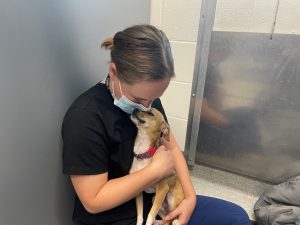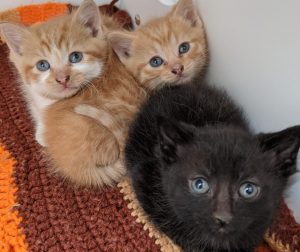
Fostering is a great way to help the animals in our community!
The Guelph Humane Society relies on the dedication of our Foster Volunteers to care for animals that may be injured, stressed or otherwise vulnerable. The goal of our foster program is to provide as many animals as possible with a second chance for a bright and healthy future. Foster Volunteers provide temporary care for animals in their homes until they are ready to be adopted. Foster Volunteers help us provide every opportunity for an animal to thrive.
Foster Opportunities Include:
- Timid or stressed adult cats that require socialization or simply a quiet place to unwind.
- Kittens over four-weeks-old, who are eating and using the litter box on their own.
- Cats and kittens requiring medical care in the form of pills, eye drops, etc.
- Nursing mother cats, dogs, and rabbits, and their babies.
- Active dogs that require a high-energy foster home where they can run and romp around.
- Dogs that are awaiting medical care or are too overwhelmed in the shelter.
- Puppies who are too young for spay/neuter surgery.
- Orphaned, neonatal kittens who require bottle-feeding every three hours.
- Dogs requiring behavior modification to help resolve problem-behaviors.

What you should know about fostering
How old do I have to be to be a foster parent?
Foster parents must be at least 18-years old and must be a decision-maker in the home. All residents of the home must be committed to, or at least, supportive of fostering.
Does the foster animal need its own room?
A separate room is a must for cats and kittens and can be helpful for small animals. Cats adjust better when they have a calm room to familiarize themselves with before being introduced into the whole house. Kittens are very messy and their own room helps contain the mess! Bathrooms are fine options. Bedrooms that people actively use are not the best option as you don’t want kittens keeping you up when you’re trying to sleep. If you have pets in the home that might not do well with a foster rabbit, having a separate room to keep the rabbit isolated from other pets is a good idea.
How long does the animal stay in foster care?
The amount of time an animal stays in foster care can vary greatly depending on the reason they are in foster care, their age, health, and adoption interest.
Kittens, for example, can be spayed/neutered as early as 8 weeks. Once spayed/neutered, they can return to the shelter for adoption, space-pending. An adult cat who is not so trusting of humans, may spend more time in foster care learning to love human affection. A dog who is stressed at the shelter may be advertised for adoption online and will not leave the foster home until an adopter is ready to take home the dog.
How much work is involved in fostering?
Neonatal, orphaned kittens (newborn kittens without their mother) require feeding every three hours, including throughout the night. Kittens that are over four-weeks-old aren’t as high maintenance as they can eat and use the litter box on their own, but they are active and can be messy!
The amount of time and effort a foster dog will require can vary greatly. Some dogs are young and boisterous and require foster care for extra training and socialization. Other dogs may be recovering from a surgery and require rest with limited exercise.
Rabbits also require foster care so that they can be in a low-stress environment before and after their spay/neuter surgery. Rabbits are very sensitive animals and need an observant, caring foster parent to ensure they are recovering successfully from surgery!
Do I have to buy the foster animal’s supplies?
GHS provides all necessary supplies to care for your foster animal. Supplies we provide include cat litter, dishes, bedding, food, toys, treats and housing (rabbit cage, dog crate).
Individuals interested in fostering kittens must have their own gram scale. Kittens MUST be weighed daily if they are under four-weeks-old and weekly if they are over four weeks old.
What are the requirements for my pets if I am a foster parent?
All cats and dogs in your home must be spayed/neutered, up-to-date on vaccinations and in good health. Additionally, your cats must be indoor cats. This is both for the health of your pets and that of the foster animals. All rabbits in your home must also be spayed/neutered in order to foster rabbits.
Do I need previous experience caring for animals to foster with GHS?
While we welcome applications from individuals with all levels of experience, preference will be given to applications with previous experience caring for the animals to which they applied to foster. Experience does not need to come from working with animals through a job but can also come from having pets.
How much driving is involved in fostering? Do I need a vehicle?
While it is not required that foster parents have a vehicle of their own, it can be a great inconvenience taking the bus or a taxi when fostering animals. Foster parents will need to transport their foster animal(s) to vet clinics throughout the city and sometimes outside Guelph for surgery or other medical care and will need to transport them to GHS for regular check-ups. GHS provides all necessary supplies for the foster animal which can include a cage for a rabbit, a crate for a dog, or a large bag of litter for cats and kittens, just to name a few. Without your own vehicle, transporting large and heavy supplies can be burdensome and transporting animals to appointments can be difficult.
Can I bring the foster animal back if it doesn’t work out in my home?
Animals in the shelter are often very stressed – being moved from the home they were familiar with to a cage in an animal shelter and now to a foster home. Our goal is to reduce their stress as much as possible. For this reason, it’s important they do not move from foster home to foster home. If you are struggling with an animal in your home, connect with the Animal Care Coordinator for support. If it is still not working, the Animal Care Coordinator will work to find a new foster home; we do require patience while we search for a new foster home as we don’t want to stress the animal by bringing them back to the shelter.

What are the requirements to foster with GHS?
You won’t be alone in caring for your foster animal, we provide all the food, supplies and medical care the animal needs. The only cost to you is your time and sharing your home with a furry friend who needs your help.
However, to make sure you can help as many animals as possible, we do have a few requirements you must meet in order to volunteer as a foster with us:
- Must be 18 years or older and must be a decision-maker in the home. All residents of the home must be committed to, or at least, supportive of fostering.
- Must be able to volunteer for six consecutive months minimum.
- Your current pets must be spayed/neutered, up-to-date on vaccinations and in good health. Additionally, your cats must be indoor cats. This is both for the health of your pets and that of the foster animals.
- Must have access to reliable transportation.
- Must live within a 40-minute drive of Guelph. If there is a medical emergency and your foster animal needs to get to a vet immediately, it must be a Guelph clinic.
- Must have a separate room for foster cats and small animals.
- Must have the time to care for your foster animal.
- Attend a foster orientation and abide by the foster agreement signed upon joining the program.
Looking for more information? Continue reading for more details on specific foster opportunities.

Fostering Kittens and Puppies
Neonatal Kittens
When kittens come in under four-weeks-old, without their mother, they will require a “human mother” – someone to feed them and help them with elimination every three hours, including throughout the night. These kittens require a great commitment, but the experience is extremely rewarding!
If you ever find kittens, please call GHS first. Many found kittens end up kitten-napped – where a mother cat is out hunting, and someone takes the kittens thinking they are abandoned. By calling GHS first, we can ask questions to find out if there is a mother around and help you catch the mother, so the kittens and mother can safely come in and receive care together.
Nursing mom with babies
GHS receives many kittens who come in with their mother, but we also, less frequently, may receive a dog with puppies, or a rabbit with kits. Depending on the species, the amount of time and effort required will vary. Mammalian mothers are great at caring for their young – feeding them and cleaning up after them. Your job will be to make the mother comfortable, ensure she is caring for all her young and closely monitor the young by weighing them daily, for example.
A mother dog will still need to go outside for short walks to relieve herself. As the young get older, the demand on your foster commitment will increase – puppies will pee and poop and require house-training. All young should have adequate socialization – handling daily by different people in the house. After they have had their first vaccines (for cats and dogs, not rabbits), you should invite visitors over to increase the number of positive interactions they are having with a wide variety of people!
Overall…
Young animals should not leave their litter until minimum eight-weeks-old. During these early weeks, kittens and puppies learn vital skills that will help them in adulthood. They learn bite-inhibition, proper play skills and essential communication skills, just to name a few! When a solo kitten enters the shelter, we will immediately place her in foster while waiting patiently for another solo kitten or small litter of a similar age to be placed in the same foster. There will need to be a five-day quarantine period, during which the new kitten or litter is separate from the solo kitten – this allows us to confirm everyone is healthy before mixing them. When fostering a solo puppy, we will provide specific instructions on how to ensure those socialization needs are being met.

Under-Socialized Cats and Kittens
Cats that enter our shelter terrified of humans will require a quiet foster home, where they can have a safe hiding spot and a gentle foster parent to show them humans are friendly. The socialization window for cats closes while they are very young. Once they are adults, their socialization can be improved but they will always have a shy foundation. This is why going slow and being very gentle is the way to go. When kittens are under-socialized, there is still time to help them come out of their shell. Kittens should get plenty of snuggles, love and interaction. This can speed up the rate at which they adjust to humans; whereas with a timid adult cat, forcing your love on him may cause him to become aggressive trying to protect himself from a perceived threat.

Dogs Requiring Behavior Modification
Many dogs are surrendered to GHS because of aggression or other behavior concerns, some of which include resource guarding, dog- or people-reactivity and under-socialization. Our Intake & Behaviour Coordinator will thoroughly discuss the proper techniques to modify concerning behavior. GHS prescribes to strictly positive training methods that encourage and motivate the animal to learn and prohibits the use of physical or verbal force to intimidate any animal. Individuals interested in fostering these dogs must have previous experience working with difficult dogs.
GHS will never place a dog in your home if there are concerns about your safety.

Other Foster Needs
Other animals may require a foster home while they recover from a big surgery, while they receive ongoing medical treatment or because they are stressed in the shelter. There may be other extenuating circumstances (such as a large intake of animals at once), where GHS will rely on foster homes to care for animals.
If you have further questions about fostering, feel free to reach out to the Volunteer & Engagement Coordinator: volunteer@guelphhumane.ca.

